#yuukoku no moriarty meta
Explore tagged Tumblr posts
Text
I'd just like to analyze this page quick

At this point in the manga, first-time readers will be familiar with William having a kind facade, while in fact being the lord of crime. As such, it's natural to assume this is a dualism of the facade (the real William that exists watsonianly) and the true self (the William we see in the reflection, that only us readers see). However, with the context of the rest of the manga, I believe there is a different interpretation: William, and the villain he thinks he is haunting him.
See, William is a kind soul, and killing others lead to him struggling under such guilt that he could not possibly see himself as worthy of any happy ending. He smokes despite hating it polluting his lungs, he sees red blood on his hands that can never be washed away. And here, too, he's haunted by a specter.
Our William, saddened as he looks as his reflection. And the specter, with a menacing grin. It's entirely unlike him, but it reflects not his true self, but the monster that he hates, that he thinks he has become. But, of course, this reflection is only seen by us readers, and by William; no one else who knows him would ever think of him as such a person.
#braincell posting#yuumori#yuukoku no moriarty#moriarty the patriot#yuumori meta#yuukoku no moriarty meta#william james moriarty#william james moriarty meta#yuumori analysis
115 notes
·
View notes
Text
I rarely see anyone talk about chapters 62-64 so I'm going to do it myself. Be prepared for a VERY long post (and possibly full of grammar mistakes). These chapters are severely slept on which I don't understand because it shows us a different side to Albert's character and how special his relationship with Liam is.
We all know that Albert has always hated how this world worked. He hated how there was no equality anywhere, especially as he saw firsthand how much his family cared about status, how they tortured their servants, and then he found out a close friend of his was only friends with him because Albert came from a family of high status. At first he tried to bring change in the society he lived in by forgiving a thief and paying for all his previous crimes. Then he covered for that thief from a nun when he was trying to commit a crime again. But then that man goes and kills someone so Albert starts second guessing if he really could bring any good change in this world. He then concluded that this world truly was as rotten as his father and brother claimed. And this thought depressed Albert so much to the point that he was ready to end his life because he felt he was too useless. But at the end he couldn't gather up the courage to do it and this made him feel worthless too.

But after that, he met William and Louis. And he saw something in Liam that made him think he wasn't alone. He felt like he had finally met someone who shared the same thoughts he did.

They start to get talking and discover they have the same motives. The only difference is is that Albert had given up hope on changing how the world works but William hasn't. In fact, he had actually made progress by winning that trial in court. Besides this, Albert also saw how William was always solving everyone's problems and making their lives slightly better and easier. That's what attracted Albert towards William.

This is why I think their relationship is so pure. William gave Albert the courage and energy to take action on what he's always wanted to do. That's why Albert made his family adopt Liam and Louis.
A year after, Albert grew more and more tired and frustrated with his family. The way they cared so much about wealth and status and how they couldn't bring it in themselves to have even a little bit of sympathy for the poor.
But he found himself unable to take the first step he needed to get rid of his family. And that's where Liam came in.

Liam gave courage to Albert to finally get rid of the people who have been frustrating him, the people who are responsible for allowing this system of injustice and inequality to keep on going.
But as we all know, when he's all grown up, Liam starts to feel all the burden of what he's doing. This is what I love about his character by the way. It's how Liam (and Albert) knows what he's doing is a sin, he knows this is not the honourable way to achieve his goals, but he's aware this is the only way to do it. Albert tried it another way when he was younger, by forgiving that thief, but it didn't work out. So Liam knows this is the only way to do it, and he's ready to be the bad guy and take all the blame after all this is done.
After he made society better, full of kind hearted people and unity, he started to feel the burden of his sins. Even though he's aware he did a good thing, he knows it is still a sin. That's why he tries to end his own life (but then Sherlock saved him and made him see things in a different light but that's a different topic).
And after all this, while Albert is in prison, he starts to wonder if he's responsible for Liam taking his own life (because at this point he, or anyone else, isn't aware that Liam survived and is living in New York with Sherlock). He starts to feel guilt too, and starts feeling worthless again. He blames himself as he wasn't ready to take the steps needed to make his goals a reality, he need Liam to lend him courage.

So Albert starts to blame himself for what happened to Liam. He feels guilty for making his hands dirty, as Liam is the one who executed almost every single plan even though him, Albert, and Louis all were lords of crime.

This panel is just so beautifully sad. Liam tried to solve everyone's problems, he tried to make everyone's lives better. But Albert feels like he only became the lord of crime because of him, and that's what made him so depressed and suicidal.
As he's thinking all this, the door to his prison room opens and William makes an (dramatic lol) entrance. And he convinces Albert that he's not responsible for what happened. William was going to execute his plan of making the world a better place one way or another.

Liam expresses after this how grateful he is to have someone like Albert, how grateful he is that he found someone who could carry the burden of this sin together, and claims he himself is the weak one rather than Albert.
He also claimed he's selfish. He and his brothers were all lords of crime, they all shared the same responsibility of this sin, but Liam wanted to escape this burden and that's why he decided to kill himself. It was done because of his ego.
But he's realised that this was no way to atone for his sins. The only way to do it is to actually live, not just kill themselves to escape it. Albert agrees with this and that's why both him and Liam agree to live and atone, even though they're both aware that the shackles of this burden will never leave them.
All of this makes their relationship so deep and meaningful. The way both of them regretted the way the acted with each other and both of them convincing the other that they weren't in the wrong. And both of their sides are understandable. I think it's beautifully written. This is why their relationship makes me so soft (and why I prefer them over William and Louis even though the latter had a beautiful relationship as well).

Anyways, if you read till here, I love you. I'm aware this post has gotten too out hand jdjsjsk but I enjoyed writing it and I hope you guys liked reading it. Let me know what your thoughts are on this, I'm happy to read different opinions (although just be respectful about it lol. Can't believe I have to say this but some people can get too heated and disrespectful over sharing their thoughts).
#yuukoku no moriarty#moriarty the patriot#william james moriarty#yuumori#yuukoku no moriarty meta#Moriarty the patriot meta#yuumori meta#yuumori headcanons#ynm albert#albert james moriarty
124 notes
·
View notes
Text
I'm sure this has been done countless times, but polls are fun and I'm curious, so... For the purposes of this poll, I'm only counting shows/books/games/etc. where Sherlock is a main or very prominent secondary character, there's a decent amount of other Sherlock canon characters represented (at least a version of a John Watson), and there are some references made to the ACD originals. Not counting where he's only a relative of the lead but not a main (like Enola Holmes, RKDD, etc.)
Not counting the ACD original canon as an adaptation here, as none of these would exist without it. Everything else listed is adapting it in some way.
There's also some series I haven't watched/read yet but have been recommended that aren't on here yet for the purposes of space, including Detective L, Miss Sherlock and the Bonnie MacBird Sherlock books.
Feel free to reblog this for a larger sample size :)
#sherlock holmes#acd canon#acd holmes#yuukoku no moriarty#moriarty the patriot#cbs elementary#bbc sherlock#yuumori#house md#tgaa#the great ace attorney#herlock sholmes#granada sherlock#granada holmes#rdj sherlock#basil rathbone#detective fiction#sherlock holmes meta#my polls#jeremy brett#rdj holmes#sherlock and co#miss sherlock#sherlock holmes in the 22nd century#acd sherlock holmes#sherlock hound#the great mouse detective#polls#detective polls
624 notes
·
View notes
Text
thinking about john watson today.
for three years (give or take), he knew that sherlock and william were alive. and he told nobody.
he spent about three years lying to the entirety of london. the only person he told was miss hudson. he didn’t even tell mycroft or louis.
he didn’t know if they were ever coming back. how long was he prepared to lie for? when would he have reached his breaking point?
and was it worse? knowing that sherlock, his best friend, was alive but never coming back? not gone but out of reach, with nothing to be done? there’s hope, but doesn’t that make it worse? he can’t grieve because sherlock is still out there, still alive, but how could he be happy when sherlock is still gone?
sherlock is alive but it doesn’t feel like it. john is still grieving, in a way, for three long years.
#yuukoku no moriarty#moriarty the patriot#yuumori#sherlock holmes#john watson#john watson my belovedddd <3#how would we feel about shitposts? i know i mostly do metas but i’ve been feeling silly#anyway#let me angst about john today
70 notes
·
View notes
Text
Okay back on my bullshit and I need to talk about these —


This to me is a direct call back by Sherlock to Liam pre- William James Moriarty. Baby Liam, before he stained his hands with all that killing and stole the identity of another child. Can you see the way Sherlock gets down on his knee like that? Know what it reminds me of?
How you speak to a child on their level.
“You’ve taken your first step …”
Also feels very child-oriented to me. And painting an ideal future …?


Sherlock is appealing here to the boy who never was; the boy who never got the chance to grow up and learn about his true self …
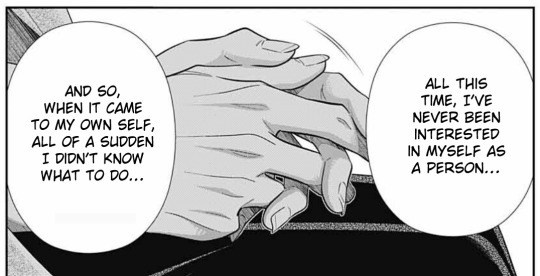
“My own self …”
Liam’s entire life has been spent behind a mask. His whole existence was that of a ghost; the shell of a dead child. He never gave himself permission to consider who he truly was; him him, and not William Moriarty, because the old him had to die in that fire all those years ago. I cannot even begin to think about what that must feel like.
And then along came Sherlock Holmes, and with a simple look during a moment of rare honesty from Liam — his genuine, child-like inquisitiveness at the sight of that spiral staircase provoking a trait that was truly his — his love of mathematics — Sherlock was able to effortlessly reach out and take the hand of the person who existed behind the mask.
A mathematician: one of the most elementary aspects of Liam’s character, indeed. His love of mathematics shone long before he committed his first act of violence. To be judged so quickly and found not to be the devil, but just a man who loves numbers — that was a glimpse of his true self that he’d almost forgotten about, amidst the pressure of his plans on the Noahtic.


Sherlock is also, aside from Louis and Albert, the only person to my knowledge who is aware of Liam’s true name — and because it was Liam’s choice to gift that knowledge to him. Recalling that Liam believed he was about to die, him giving Sherlock the evidence of his birth, as he was truly originally supposed to be, feels like a painfully poignant and intimate gesture.
Even we, the readers, are not privy to that information. It’s granted only to Sherlock; a secret they share.
The theme of rebirth is very present in the climax of the story, and Liam even states in his letter that if only he could be born again, this time he thinks he and Sherlock would be true friends. It’s desperately sad that he can’t see at that point that he doesn’t need to be reborn to get back in touch with his old self, because he’s still there inside of him. Sherlock is the proof of that, because Sherlock hasn’t found a friend and, dare I say it, a soulmate in William Moriarty, or the Lord of Crime. Sherlock has found that connection with the man beneath the mask.
During the moment on the Thames, William James Moriarty did indeed die a second time. But this time it was so that Liam, as his true self, could re-emerge. This is why he suddenly sees all those colours again — that which was buried is now brought forth towards the light.
Another small point to make is the decision to have Sherlock use Liam almost immediately. It’s a name that feels a lot more removed from the identity of William Moriarty than for example, Will. It’s new and something that’s very much separate from the dead boy Liam embodies. It’s a tiny glimpse of the branch in identities beginning once again after years of suffering his sins in silence.
I could go on and on about all this. It’s probably just obvious stuff to most people. But god damn is it the most beautiful story of losing and finding oneself again, even in the darkest depths of despair, because someone cared enough to reach out a hand.
Might just be my favourite.
#william james moriarty#liam moriarty#sherlock holmes#sherliam#yuukoku no moriarty#yuumori#moriarty the patriot#moriarty the patriot meta#Moriarty the patriot analysis
777 notes
·
View notes
Text
Albert's Masquerade Ball, his role as a Mastermind and trivialisation by the aristocracy
The Masquerade Ball, about half way through the Scandal of the British Empire arc, is a really cool scene that exemplifies the reasons for the necessity of the Moriarty plan in a way that is specifically designed by Albert, with the intention of helping Irene support their cause and inform him of what her stolen papers contain.
As a reflection of the aristocracy
The Masquerde Ball's activity of the evening is a game, where the Lord of Crime 'kills' people by spilling wine on them and the guests must figure out who he is to save the day. This shows how the nobility have trivialised the concept of the Lord of Crime, turning his genuinely threatening acts into a simple game with a quick solution. They see the Lord of Crime as either a 'gentlemanly criminal', a trend, or simply an illusion to scare others. They, since they feel untouchable due to their wealth, ignore the seriousness of the issue and turn it into an evening jaunt.
The general customs of a Masquerade, as explained in the chapters, is to be unidentifiable and unconventional. They are allowed to be rude or controversial here, but only because it comes at no price to their reputations. It accentuates the surface level nature of nobility, with its focus on reputation and social standing over anything else, including empathy.
The event's 'Lord of Crime', Baron Rollinson, doubts the general existence of a real Lord of Crime whilst essentially masquerading as a satirical take of him. His choice to target Albert for just simply being 'rude' in front of him shows that the nobles are extremely insecure at the slightest hint of dissent, and are willing to go to extreme lengths to stifle it (as seen at many points of the series). In this way, Rollinson also acts as a stand-in for any of the nobles the Moriartys' have targeted - adding to another point related to Albert which I will get to later.
When Rollinson, after being found out as the evening's Lord of Crime, dies of a heart attack, the aristocracy simply brush it off and move on as if nothing happened. This not only simulates their general ignorance and detachment from death and its effects, but their detachment from the Lord of Crime. The Ball's satirical take on the Lord of Crime is a way to reveal their genuine apathy to death and those of lower class, constructed by Albert himself.
Albert as the mastermind of this ball/'play'
Albert is clearly shown to have orchestrated this event down to the smallest detail. He is one of the main sponsors of the event, knows who their 'Lord of Crime' is, knows how to provoke him into being targeted so his meeting with Irene can go ahead, and knows how Rollinson is eventually to die. It's also set up to include a noble who is connected to Irene (since her friend died in a fire that Rollinson started to gain insurance money), and acts as a form of 'society in miniature' to show Irene just how in need of change the world is.
Once they have been targeted and 'killed' by Rollinson's 'Lord of Crime', they have their conversation on the balcony floor above the main ballroom. From there, they can see all the people and events happening from above, as if watching a play. The Moriartys continually mention crime as a performance, and this ball is essentially that but for an audience of two (Albert the creator and Irene the spectator) rather than a mass audience. Being above the main ballroom acts a representation of the way Irene and Albert have differing knowledge that makes them see the nobility through a lense that is more critical of and perhaps morally 'above' the culture of victorian aristocracy. They watch the performance unfold as Irene eventually realises not only the power Albert holds as Em and the Lord of Crime, but also the goals he has in mind - goals that she somewhat agrees with, or can be convinced to agree with.
So what point does Albert make with this? Well, in essence, this whole Masquerade - the representation of aristocratic society, the power of the Lord of Crime, the issues in society that need to be fixed - it is all in an effort to get Irene to side with them. Albert sees Irene as a useful asset with not only the papers she possesses, but her own skills and goals in changing society to be less classist too. Albert specifically mentions her successor, Martina Meier (who was murdered for simply being working class and successful in the acting/performance industry), as what pushed Irene into extortion of the rich - and shows her a taste of a more permanent solution to what she has being trying. It is Albert's knowledge of Irene's past and friends that helps him truly win her over, tailoring a situation and noble victim to her experiences.
But the event is also in itself generalisable to any noble who has committed evil acts. Rollinson (as mentioned) could act as representation of any noble, and the method of death (heart attack) is much reminiscent of Chapter 2's Baron Dublin's death. In this way, whilst the plot has many personal relations to Irene, it is also able to be seen as generalisable enough where she can see how it may affect many other of the 'evil nobles' the Moriartys target. She can see the usefulness and possible future targeting of the plan through Albert's 'play'.
So, Albert has created a performance that acts as somewhat of a mini test run of the idea of 'crime as a performance', tailored to one specific person as a recruitment tool. Albert has proved himself to be a mastermind of crime and also persuasion, and they have managed to progress their goal of removing 'rotten nobles' in the process. And it's all executed in such a gripping and interesting way, which I adore.
[I freaking love this scene man. Perhaps one of the best Albert centric plots if not THE best. It's all so interesting in the way it's staged and what it says about society, Albert and also Irene. There was probably more I could mention but it's nearly 11pm and I am tired. I hope to make more of these as I reread the manga from time to time, to talk more about scenes that deserve analysis.This part is Volume 6, or Scandal of the British Empire Act 4-5 specifically.]
#moriarty the patriot#resident moriarty the patriot yapper is back#i love these chapters so much they're so cool#ANALYSISSSSS#albert moriarty appreciation#meta analysis#albert james moriarty#yuukoku no moriarty#yuumori#sherlock holmes#william james moriarty#irene adler#and i love analysis
68 notes
·
View notes
Text
modern AU Albert (a man who has never been to Tennessee nor, in fact, to a club) absolutely belting Pink Pony Club in the kitchen using a whisk as a microphone, turns around and finds Mycroft just standing in the doorway with his hands behind his back doing that very particular barely-contained smirk that Stephen-Fry-as-Jeeves does, do you see the vision?
#moriarty the patriot#yuukoku no moriarty#albert james moriarty#silliness#this is funnier the less they know each other btw#like maybe in this au they go straight to Louis working for Mycroft first and he and Albert have met like. twice.#some sort of meta joke here in stephen fry having played mycroft holmes
26 notes
·
View notes
Text
Do you think if Albert really confident on himself or it just his mask?
I got an ask at tellonym about Albert and I think it's interesting so Imma share it here too.
tbh. oh boy i think this is gonna be long, prepare your wine!
Albert, even though forced at first, had been doing it (socializing) since he was very very little. So I think he was masking his confidence as a child. Now, he grew and he kept doing it, and the fire happened, and he had a new purpose for 'masking' himself. If he did it out of duty before, now he did it because it's his role. Doing it over the years made him acknowledged by people around him, the nobles and also people in his household. That must had given him more and more confidence. like for real.
When he was an adult, I think it kinda integrated with his real self? Like, he could own it and it was his. It was already his. It's very hard to explain but I can relate so much. I grew up like him, in a similar setting, in this terms (being confident). Also, as an INFJ like Albert. we do own our masks. Like, we embrace them as a part of ourselves in a way? So Albert, I think he is confident genuinely, but it can also be a mask, sometimes. Like that time in the Final Problem, when Will changed the plan and Albert said "I know you Will, you have a plan in mind..." I feel like that one was a mask. When he revealed himself to Irene in the ball, that's genuine.
I think anon asked about this because we all see him being so vulnerable after spending three years locked up in the tower. Was this person really the same confident Albert we saw before? Yes, he was still Albert all the same.
I think, Albert stripped from his confidence could happen to anyone in the same situation. It's not that he lost his purpose to live (supporting William's plan), but he found a new purpose. That was, to suffer the weight of sin and shame in place of William as the Lord of Crime, and he truly lived for that purpose. He beat himself again and again until he felt worthless or even worse than that. He was fulfilling his new role and gosh, he was devoted to it. You know what, I think that he was over confident that what he's doing was right XD
After that we saw William pulled him up again, and so he was given another purpose to live. We saw him humbled but hey, he was still teasing Moran right? He probably was masking it again but I think it came so naturally because it was seriously a part of him. Being confident, that is.
Maybe, we can never know. Maybe he wouldn't be able to distinguish if he's masking his confidence or not. But that's just who Albert was :)
#I TALKED TOO MUCH SORRY#also me bringing me eastern way of thinking here..#i love this complexity from Albert tho#albert james moriarty#moriarty the patriot#yuukoku no moriarty#yuumori#yuumori metas#my metas
27 notes
·
View notes
Text
Sherliam and sleeping positions: a ramble
The way sherliam is, i dont think they cuddle to sleep. They dont make out and run their fingers through each other's hair before going to sleep in each other's arms and here's why:
As much as I melt over every sliver of physical affection in fics, none of their primary love language is touch or physical affection. I'm pretty sure someone had talked about their love languages, but ive been thinking about this a lot so im not sure.
Sherlock's touch is a bit on the casually rough side. A small punch to the shoulder, a ruffle of hair, a pat on the back. But following his character development in NYC, he had become a lot more gentle, both physically and emotionally. Still, I don't think he's big on touch because, well, he's sherlock.
William is somewhat more comfortable with touch. A supportive hand on shoulder, a tender brush of lips, fingers deliberately brushing against the other's while reaching for the same thing. While it does suit him more, his main love language isnt touch either. He is much more of an acts of service kind of guy, which furthers his guilt in early nyc days of letting sherly take care of everything for him.
Now, what their love language might be, which is code for what i firmly believe it is, is quality time. Throwback to Durham date, sherly turning a murder case into a game just so could spend more time with moriarty before they get off the train, the "i wanted to leave everything just to continue spending time with you" snippet from William's letter. It makes perfect sense that their love language would be quality time.
They're happy to be beside each other. They're both exceptionally intelligent, it wouldnt be out of character for them to just... absorb the love without having to touch. They can feel the love in the serene quietness of their apartment in the morning. They can feel the love in "what do you want for dinner?" "i did the dishes while you were gone." "im making coffee for us both." They know the love is there, they dont need to be all over each other to feel its presence.
As one of my favourite books of all time says, intimacy is not about sex. Its not about touches or kisses or lips on necks. Intimacy is about the truth. Intimacy is when you lower your walls and let someone in. Intimacy is when you show them the entire truth of your existence and say "do you still love me?"
And thats what they did. They know each other. From the favorite brand of coffee to the subject of their nightmares, they know each other like no one else does. And that's more intimate than any form of touch ever discovered.
So here's what i think, they dont sleep in each other's arms every night. At least, they dont intentionally. They have their own sides of the bed. They might fall asleep facing each other, but thats as much as they intend.
Now unintentionally, thats a different thing. By unintentionally I mean the nights where sleep doesnt come to one of them, and the other slides closer to play with the his hair. And nights where Liam cant sleep from nightmares and sherlock sleepily pulls him against himself, unknowingly rubbing circles on his back with his thumb. And nights when sherlock remembers sitting beside Liam's bedside, desperate to see those carmine eyes open again and so he reaches out to cover Liam's hand on the blanket with his own just like he did back in the hospital, feeling his eyes droop because he knows this time when he wakes up those eyes will be open too.
My point is, when they do touch, they make sure it means something to both of them. Which is why they would not be big on cuddling and snogging.
#is this my own meta? yes#will i intentionally ignore it just so i can be delulu that they spent four hours every day cuddling and reading books together? also yes#moriarty the patriot#sherliam#yuukoku no moriarty#william james moriarty#sherlock moriarty the patriot#yuumori
118 notes
·
View notes
Text
the politics in yuumori is sort of weird a lot of the time and also not really the point, i do think its really more of a plot device than anything else, but it made me think about what other angles it couldve taken if it had been made with a background context more familiar with uk history and social issues and explored that more, like one way it couldve gone is instead of the nobility stuff, for example going with what we usually think of around victorian class inequality and focussed on industrialism and capitalism and stuff, or imperialism, or like specific political movements then (labour, marxism, etc), or like in general im curious about how it couldve explored actual social issues like that more realistically
#like i dont think this is how it shouldve gone or anything i just think the different ways of representing the society are interesting#i think that the outside perspective is really necessary to get that story with such a different take on holmes#and like mostly the politics is just a plot device really#like i dont really care its not realistic but like im sort of curious#i think the closed they came to actual politics was the mp voting rights thing which didnt seem too off#but actuly ive forgotten almost all the history i was taught#this isnt really meta is it?#moriarty the patriot#yuukoku no moriarty#yuumori#sherlock holmes
17 notes
·
View notes
Text
Yuukoku no Moriarty Meta Masterlist: Useful Notes, Translations, and Miscellany
Since Last Update
William and Louis’s Biological Mother
William’s Handedness
Feeding Coma Patients (Ask)
Everything Else
YuuMori Names, Nicknames, and Honorifics Chart
Mykie
Cockney
Hand Gestures
Historical Accuracy (Ask)
Sherlock’s Drug Addiction (Ask)
Albert’s Situation Post-The Final Problem (Ask)
William’s Whereabouts Post-The Final Problem (Ask)
Vermissa Valley and Travel Time (Ask)
Volume 14 Info (Ask)
Where Was Sherlock Before Returning to 221B (Ask)
Enola Holmes and the Public Domain (Ask)
Team Moriarty Personal Data
Team Holmes Personal Data
Canonical Intelligence Rankings of YuuMori Characters, via Jump SQ (Ask)
Viz’s Translation of Chapter 31
Various Things Were Left to Louis (Ask)
Yoroshikuyaru (Ask)
Chapter 66 Translation
Chapter 67 Translation
Chapter 68 Translation
Chapter 72 Translation Bobble (Ask)
Potential Liturgical Birthdays for William and Age Notes (Ask)
Translation Notes on That Train Scene
Translation Notes on the Sherliam Proposal (Ask)
Translation Notes on Moran’s Relationship with Albert (Ask)
Translation Notes on Sherlock Swearing to Catch the Lord of Crime (Ask)
Takeuchi-sensei and Storyboards (Ask)
Mycroft’s Loss Translation Notes (Ask)
Canon Birth Years (Ask)
Patterson and Hope
Details of William and OG William’s Childhood Violence (Ask)
Fred’s Age (Ask)
40 notes
·
View notes
Text

I need to reread the Yuumori manga now that I've finished my rewatch, but one thing just occurred to me: Sherlock uses disguises fairly often in ACD canon (all credit to @thenorwoodbuilder for this thorough post with the details), but he doesn't disguise himself much in Moriarty the Patriot, does he? I don't have the best memory, but I can think of only one time he uses a disguise in the manga as far as I've read, and that was to surprise a friend.
It’s unusual for him, but maybe it's because his role in this adaptation is different than most Sherlock media. He’s usually not the one with the grand plans, the mastermind, instead he’s the one unraveling things after the fact, using his intellect but not as much scheming ahead of time. We see much more planning scenes from the Moriarty group’s POV, as their operations are more of the focus.
From what I remember, Irene, Bond and Fred use disguises the most here, and Liam does a little too after the fall when he returns to London (otherwise mostly preferring to cover up with hooded cloaks), but Sherly so far hasn't tricked one criminal that I can recall by using a more in-depth disguise. He'll use ruses for sure, like in The Sign of Mary or A Scandal in the British Empire, but besides putting on a hat or pretending to have a different job, he's generally just being himself without too much physical alteration.
Maybe it’s also because there’s already a few different characters who specialize in disguises, that as a result the creators chose not to focus on that approach with Sherly? Irene and later Bond particularly have a talent for them coming from the theater world, so maybe Sherly doing the same often would be too redundant in the story?
#moriarty the patriot#sherlock holmes#pbjelly thoughts#yuukoku no moriarty#acd canon#acd holmes#yuumori#irene adler#fred porlock#james bonde#sherlock holmes meta
14 notes
·
View notes
Text
I love this long analysis so much. Albert is really fragile and the fact that he relied on William so much and saw him like the sun. Well, I have another ship that literally see each other as suns, and I think that's exactly what attracted me to AlWill as well. Albert and Louis both looked down on themselves and put William on the pedestal. Meanwhile William, in his mind, also putting the others above himself. Like how he relied on Albert in showing his distress and vulnerable self, and how he wanted Louis so be pure and stainless for the new world he's creating. These three... They're adorable and sick in the same time. I love their complex dynamics!
Thank you for posting this! I'm excited to read more from you :D
Since I finally had the courage to start posting, I had to talk about this before anything.
Albert and William's relationship. (Hopefully Louis next 'cause he deserves so much more than what he gets in the manga)
This is really long so you may wanna scroll and move on👍, but if you are prepared to read through a probably hour-long ramble of these two then you're welcome and very much appreciated 🫶
⚠️Mentions of suicide/suicidal thoughts⚠️
Chapters 62-63 discusses it anyway so let's go by them:
Before William, Albert was sickened by the way society operates (the whole "upper class is yay and working class is ew" system). He tries to change things locally, since, as a child, his changes were small, helping out at the church, buying the kids at the orphanage books and donating money (in this case, asking his father?) for necessities.

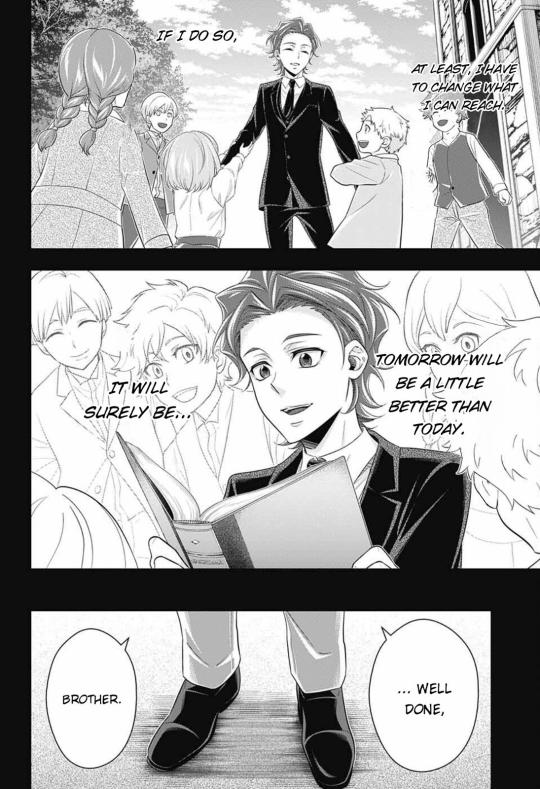
He knows he, alone, can't change it and is actually satisifed with the fact that whatever he does would still make things better, even if a little.
His views about himself change when he comes across a man who stole bread. He pays for everything that man has stolen and gets him a job (at the church/orphanage), believing he had done the right thing. What does that man do? Try and steal the silver cutlery Albert brought for the church.

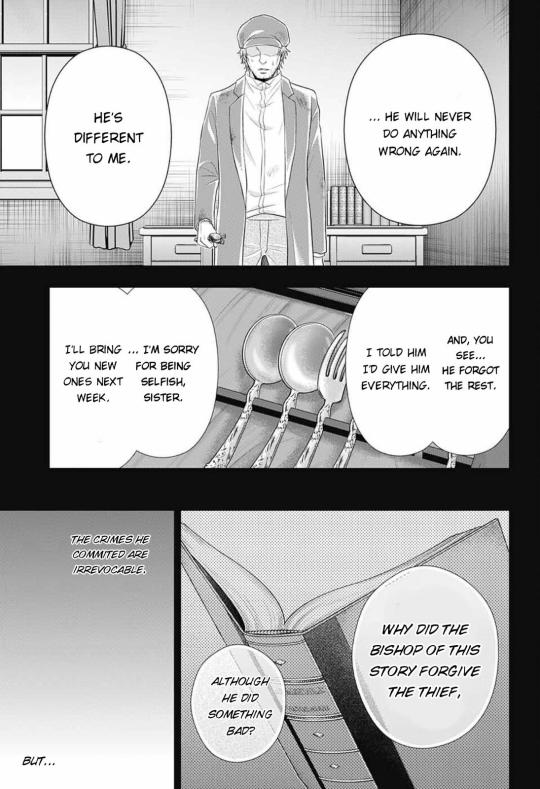
(Side note: I love the refrence to Les Miserables, a favourite french novel of mine, in which the mc Jean Val Jean steals bread but the kind Bishop of the town sees him and pays for everything Jean has stolen. The Bishop gives him a home, but Jean ends up repaying him by stealing the Bishop's treasured silver cutlery. Now that sounds familiar, huh. Jean is caught by the police and brought to the bishop to confirm whether or not Jean is lying about the bishop "giving him the cutlery". Instead of confirming that Jean was lying, the Bishop smiles and says yes he gave them to him, and proceeds to give him a pair of silver candle-stands saying "You left in such a hurry you forgot these". Concluding, Jean promises himself to live an honest, better life after meeting someone like the Bishop. (Jean becomes a symbol of equality between the nobles and the commoners, helping the poor and never patronizing it)
Albert hopes his actions are seen as that of the Bishop for someone. That someone would be so moved by Albert granting them a second chance, that the person would become better and try to better the world as well, and so he does that for the man. Though that backfires horribly, and the man kills someone/himself (it wasn't clear in the translations I read if he unalived himself or someone else).
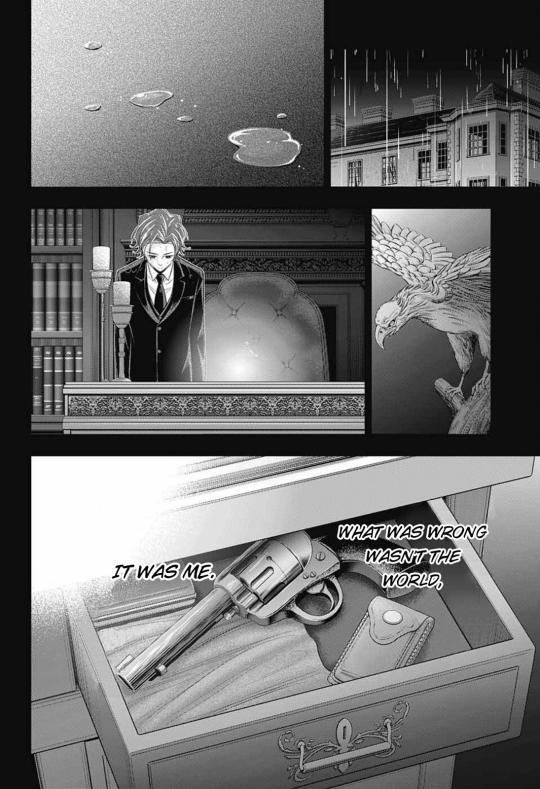

This takes such a big toll on Albert mentally he decides he's the "wrong" one born into the wrong world, not the "right" one born into a wrong world. So he decides to unalive himself (reading that ch. for the first time hurt). But doesn't have the courage to, which makes him feel worst.

WILLIAM FINALLY COMES INTO THE PICTURE AND SAVES HIM IN MORE WAYS THAN ONE AND THE WAY THE WHOLE PANEL JUST GOES FROM DARK TO BRIGHT? ALBERT'S EYES ARE SO CLEAR UNLIKE THE PREVIOUS PANELS WHERE THEY ARE DARKENED.

William not only returns Albert's beliefs that the world itself is wrong, he affirms it, and the fact they haven't even spoken yet when this happened says alot about what's to come.
"He existed, here in the same world, someone with the same soul I had"
Excuse me while I sob about how much I love the characters' interactions and relationships in this series.
Anyways, Albert investigates him and finds out about the trial William won (that's a topic for another day for sure because that trial was lowkey funny to me). He realizes William is the one with the courage to change the world. And so he talks to him, and William's response further lightens up Albert.

WE'RE BACK ON WILLIAM BEING A SUN THING AGAIN, WILLIAM'S LIGHT NOT ONLY SHONE ON ALBERT. HIS BODY AND SOUL HAVE BEEN "BURNED" BY IT.
Ahem anyways, even though William had the "wisedom" and "courage" Albert desired, the "courage" wasn't enough to make that ideal a reality (at that time, Albert didn't actually believe William was serious about killing). He, Albert himself, also lacked that courage and wisedom.
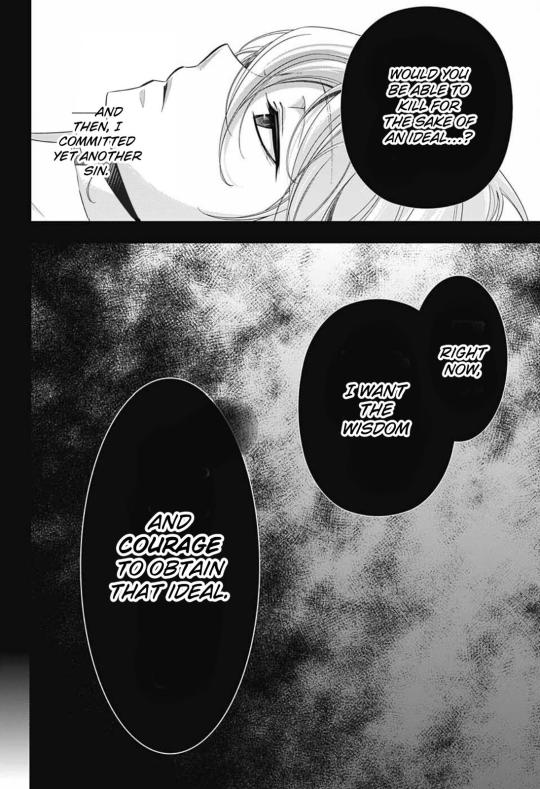
That's why, he asks of William to give it to him, the courage, not just courage, but the courage necessary to kill and continue to do so until the ideal world is achieved. As well as the wisedom to achieve that ideal world through these killings. (since obviously killing without a thorough plan would just be pointless mass-murdering)


Now William leads the way for Albert by killing Albert's biological brother, og William, and I headcannon (since we don't see William's face while he kills for the first time) that William sucked it up and (maybe) showed Albert a relaxed/nonchalant face to make Albert feel better about doing what he wanted to do for sometime now but couldn't. With profound courage, Albert choked his mother to death.
Friendly reminder for the next few ones that William is canonically a "kind child".

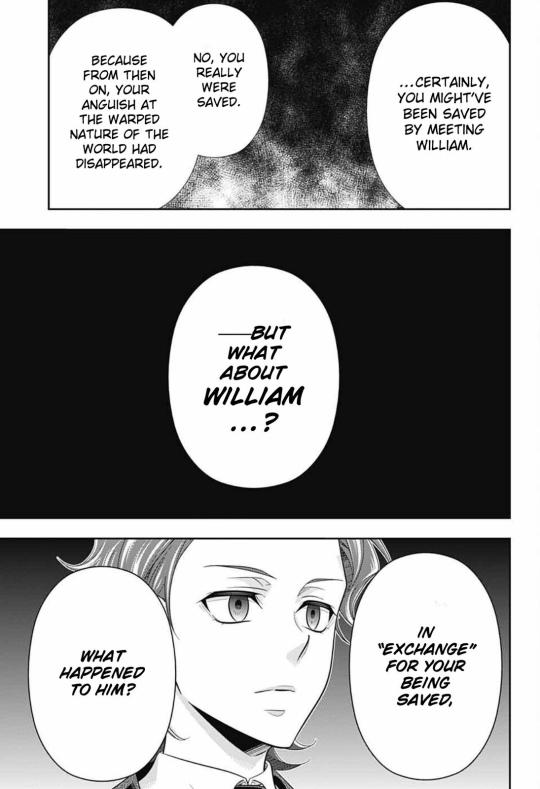


Here Albert's interpetation of William as a child is a bit off (William later kindly refutes the whole "making no distinction between good and evil"). But it goes to show how Albert saw William, and seeing him in this kind of light heavies the guilt of what he asked of him.
I loved all the religious references in this chapter but the forbidden fruit Adam and Eve had is my favourite.
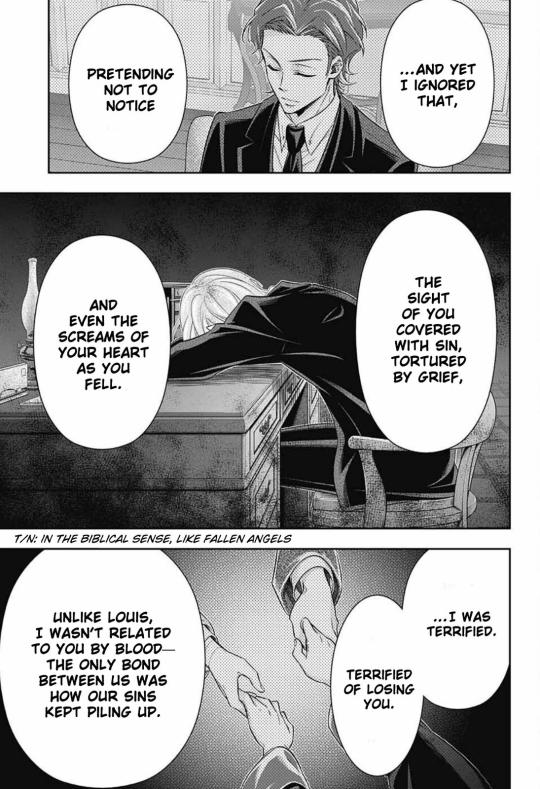
This panel ALONE says alot about just how important and precious William is to Albert. Albert also places more guilt on himself by saying that he ignored William's "screams" even when he knew. But the fact Albert knew in itself says alot because if there is one thing William never discloses about himself, it's what burdens and saddens him, so Albert and ONLY Albert knowing shows how much William trusts him. (again, William later states that Albert was actually the closest one to know of William's true grief AND comfort him).
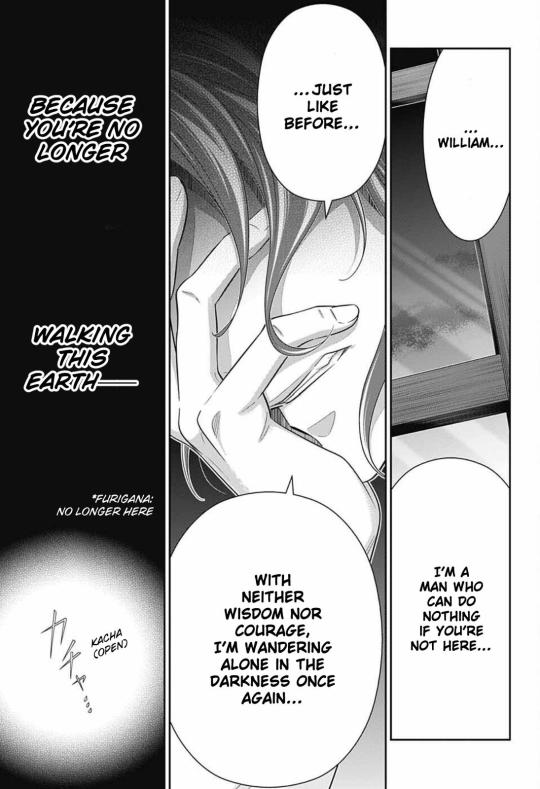
Albert finaly realizes. The courage and wisedom he "borrowed" from William wasn't a one-time thing he used to take his first steps. All this time, he has been using it as a light leading his way and now that William is gone, he's lost again.
ALSO I MIGHT BE TAKING THIS TOO FAR (it's getting too much but I am an overthinker🤷♀️) BUT THE WHOLE LEFT CORNER PART OF THE PANEL BEING DARK AND THE "DOOR" SIDE BEING THE ONLY LIGHTED/WHITE SPOT. AND THE FACT THE ONE BEHIND THE DOOR IS WILLIAM. IT'S LIKE IT'S JUST YET ANOTHER INDICATION THAT WILLIAM IS ALBERT'S LIGHT.

Thank you lots for staying with me, it geuinely makes me happy knowing people, even if there are few, who share my enthusiasm are out there <3.
#yuumori metas#albert james moriarty#william james moriarty#yuukoku no moriarty#moriarty the patriot#yuumori#can I count this as AlWill#I will#alwill#albert x william
65 notes
·
View notes
Text
I genuinely think William’s real name is actually still William, just with a different surname.
Hear me out.
#1 — irony.
Remember the omake where Bonde asks him and he’s got his ☺️ face ‘that’s a secret, heh heh heh.’
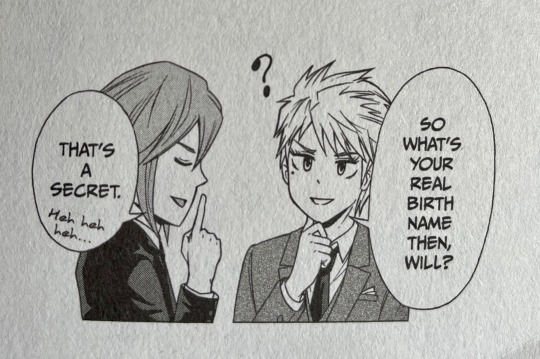
Lol William is the biggest mischievous jokester going. This would be his exact reaction if people were asking like 👀 omg what is it?? And all along he’s like, lol will.i.am guys, chill. No-one cares about your first name, it’s your surname which means anything around here. You’ve all been barking up the wrong tree. Which brings me on to my second point ~
#2 — symbolism.
I cannot scream enough about how bloody genius it would be for William’s name to be, in fact, just William, but with a more common surname like ‘Smith.’ For the purposes of this discussion, let’s call him William Smith. As an orphan, he gets adopted into the family Moriarty, where there is in fact another William: Master William James Moriarty. Immediately, you have two boys of similar ages with the exact same first names, highlighting how, in fact, they should be equal if we’re looking at their basic information and identifiers. But what is it which sets them apart, and is the very message and theme running through the heart of Yuumori? Class inequality. And what dictated your social class at the time, so very unfairly? Your family lineage.
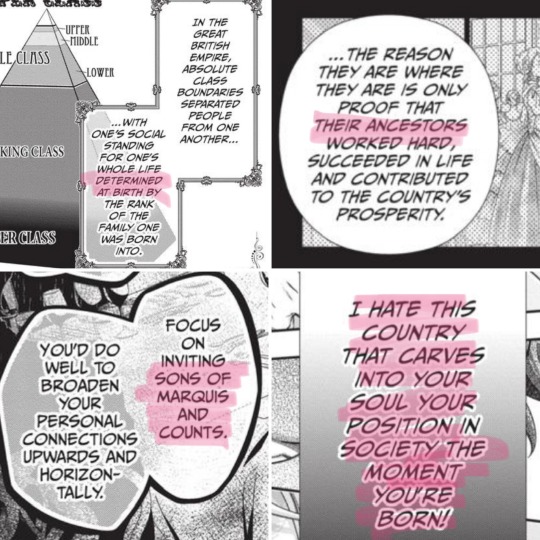
The name of Moriarty is what gives Albert’s little brother his superior, privileged position in life, over William ‘Smith.’ And yet, they are both young boys, both Williams, both should have the same sort of start in life in the equal world our William wishes to create. But they do not; the moment they are given their surnames — the moment those are penned on the paper of their birth records following ‘William’, the chasm that divides these boys is immense and unfair.
#3 — interesting coincidences, hints and clues in the text.
• William loves Shakespeare — that’s part of his identity in the same way being a mathematician is. He quotes Shakespeare all the time, he grew up in a library and has all of the plays memorised. Shakespeare’s first name was also William. Additionally, Shakespeare’s birthday is believed to be April 23rd. William’s birthday is listed as April 1st — April Fool’s Day, and it has been confirmed that this is a fake birthday, so we don’t know his real one currently. (But my guess is it’s still in April).
• The Moriarty’s never call William by his name, pre-fire, but the children at his orphanage do, and they call him Will.

At the Moriarty house, he is on the receiving end of more hate than Louis; they seem to despise him to the nth degree. I wonder if this might be because he shares a name with their precious William, and this irks them. They refuse to call him by his name because that doesn’t belong to him, filth from the streets, it belongs to their beloved son who can do no wrong.
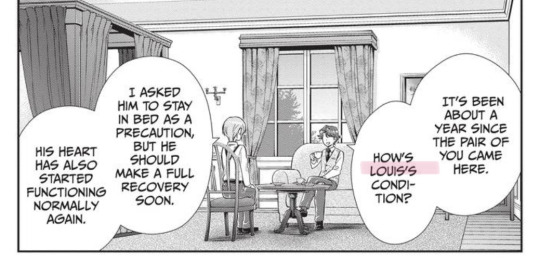
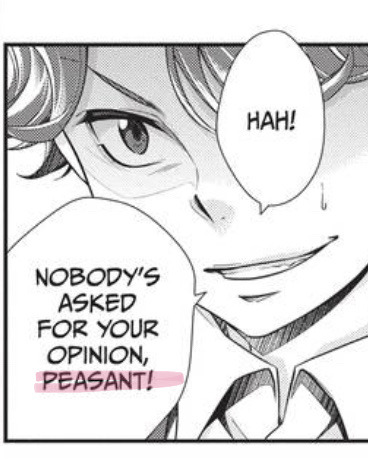
I can see a mother like Lady Moriarty refusing to call another boy by the name she gifted her son, especially when William reminds her that there is something she had in common with his own mother — someone who she would view as completely beneath her: they chose the same name. What a disgrace, to be associated or viewed as having a similar mind to a woman of such low standing!?
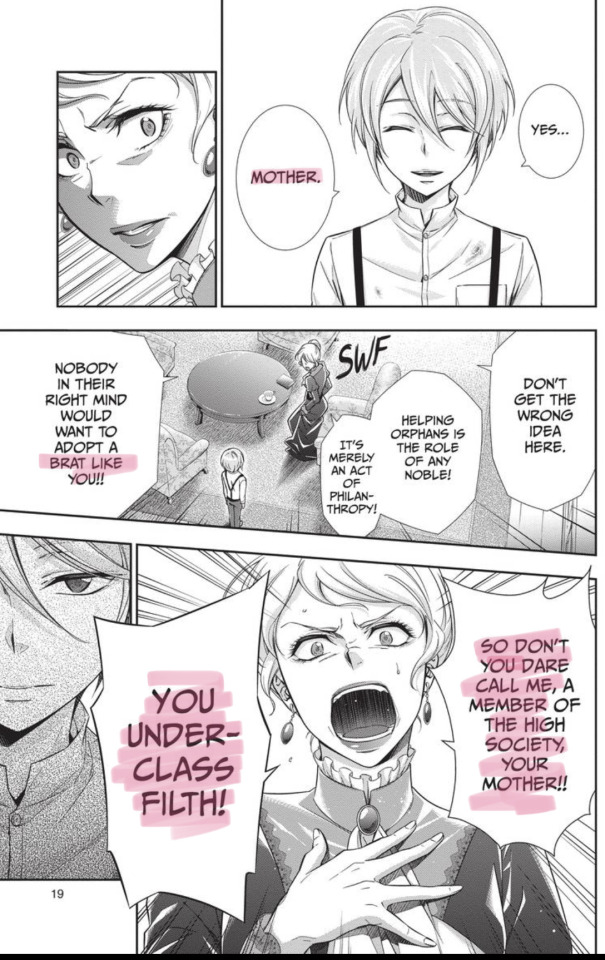
We also see William only ever call William Moriarty with the title ‘master’ in front, as though he also feels the need to make the distinction. This could just be because he’s trying to be polite, though. I could honestly dissect the entire first chapter panel by panel and highlight how William being William is such a simple but perfect concept which highlights this noble family’s insecurities, discrimination and narrow mindedness. William Moriarty feels the need to constantly reaffirm his own identity in the presence of our William.
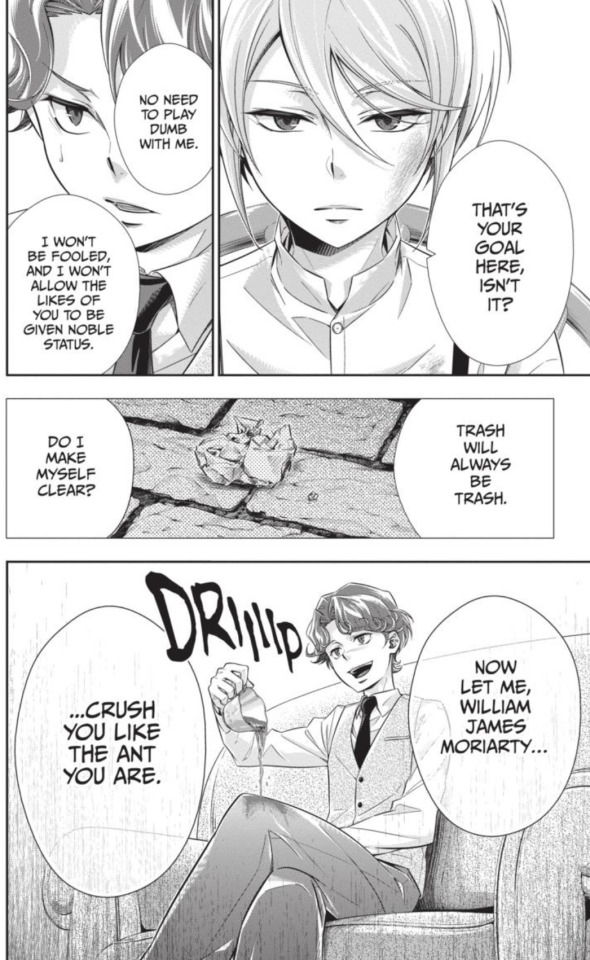
Because … if they share full names now, with the adoption … the lines are blurring. What makes one William Moriarty superior to the other? A worrying thought indeed for this boy. (Answer: there is no difference, they’re both equally deserving of opportunities in life.)
It all makes such perfect sense and explains away the awkwardness of the writer having to avoid use of William’s name simply because ‘it needs to stay hidden to create the mystery.’ This gives the characters themselves reason within the text to avoid using it, which makes everything so much more authentic and real. It makes sense because it does, not because it has to for the plot.
• William promised not to steal anything. Twice, we see him reassuring and then reaffirming that he wouldn’t steal anything, and both times are in the presence of William Moriarty.

If we want to take this statement in light of names, and toy with that lovely device foreshadowing, William having always shared the same first name would in fact mean that statement holds true — he did not steal William’s name; it was always his own to begin with, and Moriarty was a name given to him as part of his adoption, the same as it was given to Louis. He really didn’t steal anything, despite the fact that he was probably made to feel guilty or worthless every day because of the name he shared with William Moriarty.
This also means that William probably never actively deceived any of the townspeople, either; it really was just a case of mistaken identity which he manipulated for his own cause.
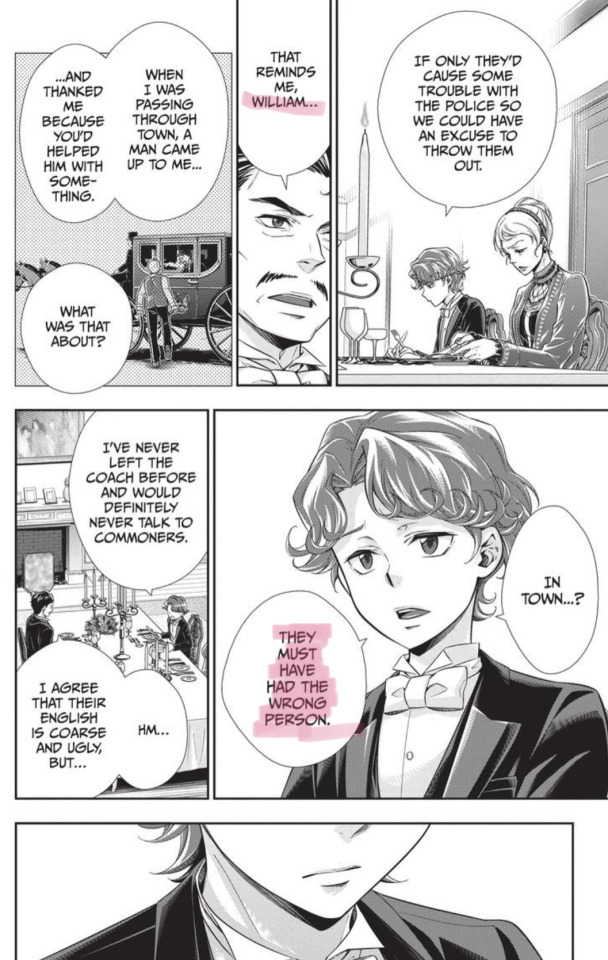
The townspeople made the mistake, rather than William outright lying. William is, by trade, more of a master manipulator who turns situations to his advantage with his quick thinking, rather than straight up lying or deceiving people (see: The Merchant of London.)
• Sherlock saw his birth name but never mentions it. And still chooses to call him Liam. Yes, we might’ve had a conversation happen off screen. Yes, Sherlock might choose to do that because that name is sentimental and William has asked not to be called his true name for reasons unknown. But it would fit so beautifully if William really is his name, and Sherlock’s realisation that day when he read the birth records was that oh, so this — William ‘Smith’ — is Liam’s real name. Naturally, he would continue to call him Liam with no discussion needed, because it’s a shortened version of William.
• We have lots of characters who share the name William, but with different variations on the shortened version; another symbol of how people can be equal in some senses but also their identity can be individual to them also. William H Bonney is Billy the Kid, the mathematics genius William and Sherlock stumble upon in Durham is called Bill Hunt.
#4 — practicality and marketing.
People become attached to characters and their names, and there comes a certain point in a work where it’s very difficult to alter a character’s first name and still retain a fan base’s sense of identity for that character. Calling William say, Robert, from now on, or revealing that as his true name while we continue to see him referred to as William is all sorts of confusing, emotionally. Perhaps it’s just me. But the idea that I’ve been calling William the wrong name all along feels off and sad, whereas the knowledge that he’s at least been able to keep that part of himself consistent, when everything else has had to be an act, is actually really comforting and empowering.
I’d love to write another thought dump on why William being William all along is also, so very emotionally delicious when you explore the implications in the story; it’s heartbreaking and makes him an even more sympathetic character who I just wanna hug, so perhaps I’ll come back to this! Because re-reading those earlier chapters with this in mind really hurts so good.

He stole nothing; he was always the true William, that at least is one thing that always belonged to him — it was only society and us that dictated there was one William worth knowing more — was more interesting and held more narrative power — than the other.
This is still William’s story.
#william james moriarty#william moriarty#yuukoku no moriarty#moriarty the patriot#yuumori#William Moriarty analysis#meta#Yuumori analysis#Moriarty the patriot analysis#meta analysis
305 notes
·
View notes
Text
Moriarty the Patriot and crime as a performance (The Noahtic crime vs Whiteley's crime)
[I am back again to talk about some themes, I don't know how much i'll be able to post with a-level exams coming up but in about a month's time i'll be able to post however much i want. I do have another post on the go but I don't know when that will be done]
As I read volume 10, I took an interest in how Milverton explained his plan to turn Whiteley into a murderer. And there was one line that really made me think, where Milverton says that "The 'hero' of our performance will be arriving at home soon." It seems like a simple enough statement but it really is indicative of a larger theme - the performance of crime. A theme explored by both this arc and the majority of William's crime, and even links to Whiteley's eventual demise.
To begin, an explanation of Milverton's plan to force Whiteley into murder. Milverton is somewhat of a free agent - as much as he represents the House of Lords when conversing with Whiteley, he is not affected by their reputation. He doesn't care about Whiteley possibly publishing the documents because he will not be caught up in the consequences. His main reason for his plan is pure thrill - the thrill of drawing the good man into sin. By blackmailing Sturridge, one of Whiteley's police bodyguards, over the safety of his family, he is able to eliminate every person Whiteley cares about, forcing Whiteley into killing out of rage. Essentially, Milverton is the snake tempting Adam (instead of Eve) to eat the apple (commit sin, in this case murder) for his own enjoyment.
In this plan Whiteley is made to become a villain through his own rage at the murder of his family. With this act, his goals of equality are tarnished and the equality movement is heavily pushed back due to the public seeing a figure of good draw to evil. Milverton actively manufactures a situation to make this possible through his go-to method of blackmail. Milverton has set the scene and has put the events in motion - he is the one in control of this performance as the writer type figure.
However, a wrench is thrown into the projected plan. With the Moriarty Brothers plan of killing Whiteley and blaming the Lord of Crime for his family's deaths, Whiteley is made into the tragic hero of the story, someone with virtuous traits who (because of a fatal flaw) meets an untimely end. The public may see him as a martyr for the cause of equality, but the reader sees how his fatal flaw (the murder of Sturridge) leads to his early death at William's hands. Yet, Milverton insists that he is still in control - not only has his plan to corrupt a good man worked, but it's also pushed his new rival into a corner where he has to take the blame for something he didn't do. His performance may have changed, but these unexpected changes have made it more compelling for his audience.
With this change, it is quite good to compare this plan to that of William's plan on the Noahtic. In this plan, William manages to drive a man to commit murder and exposes his crime to the world, much like Milverton planned to do. However the key difference is the motive - William does this to expose an evil man for previous evil deeds. His target, Lord Enders, was kidnapping random civilians to murder for his own enjoyment, and was also very dehumanising towards the lower classes. Enders is a textbook target of the Moriarty Plan - a rotten noble abusing his inherited power to hurt others. The plan to expose his crimes involves a stage and a performance in more ways than one - not only did they utilising an actual opera performance, but they manufactured a situation to expose Enders for murder. With his murder and eventual suicide, Enders' deeds are exposed to the world and he received his punishment.
Another aspect of performance is the entire Moriarty Plan in itself. By turning London into an audience for the staged crimes, the classes will unite to condemn the murderer (the Lord of Crime) and to support the heroic detective (Sherlock Holmes). Sherlock is a later insertion into the narrative, yet a very important one - a detective exposing the crimes of the nobility through solving cases that William has set up. He is turned into a symbol for the people to root for, much like Whiteley was with and without William's intervention. Sherlock is much more than a chess piece in the plan by the tower bridge confrontation - he is the centre of it besides William as the Lord of Crime. The protagonist of the plan to match The antagonistic Lord of Crime. To the people of London, the entire Moriarty Plan is a performance of crimes solved by detective Sherlock Holmes' heroism, much like the books that Watson (or Conan Doyle) writes.
Milverton and William both use crime as a performance of sorts, but for very different goals. Whilst William uses staged crimes/exposés to bring awareness to the crimes of the nobility and unite the classes, Milverton uses it as a personal experience of the thrill of turning a good person to evil deeds. It also directly ties in to their definitions of their own crimes - The Lord of crime as a 'necessary evil' vs Milverton as 'pure evil'. And whilst The Lord of Crime's performance is made for the wider audience of the public, Milverton's performances are his own personal works of art, made to give him the thrill of manipulating others into sin.
Essentially, there is a face off between two different performances of crime - the selfless performance of one's downfall created for the greater good vs a twisted performance of someone else's downfall created for one's own selfish thrill.
[I tried to keep this one shorter since I have revision to do, but I wanted to talk about this a little bit, causing it's just recalling interesting. It's quite hard to explain but I love themes and characters like this. Hope people enjoy!]
#resident moriarty the patriot yapper is back#love writing essays on this stuff instead of alevel revision#i love hyperfixations#long post#about to start another one tune in soon#yuukoku no moriarty#moriarty the patriot#yuumori#sherlock holmes#crime#william james moriarty#albert james moriarty#charles augustus milverton#and i love analysis#meta analysis
30 notes
·
View notes
Text
Trying to start a giant-ass meta on why I ship Mycroft/Albert and what there is to see of it and right off the bat I'm like...I want people to look at every single panel of their interactions.
No, it's not Sherliam levels. And BIG OLD DISCLAIMER: very little of what I'm going to present here is like "We were clearly intended to read it this way." I'll always argue that Sherliam is meant to be romantic: it hits so many well-established notes and tropes it's almost impossible to think otherwise. MycAl is a bit different. I do think it's definitely like...we're welcome and even invited to see it. But a LOT of my shipping it comes from the way I personally read and interpret things. So this is about explaining what I'm seeing that makes me ship it, rather than trying to be like "This is canon and you should agree with me." Anyway, for reference, I'll be using the official translation as far as it goes and then swapping to teawaffles' wonderful translation for the rest!
So...like right off the bat throughout the entirety of their Chapter 4 interactions their body language and expressions and ways of talking are so flirty? (Also, I still find it funny that in the manga Mycroft is introduced before Sherlock and thus Mycal is introduced before Sherliam. Older bros first lol.)
Maybe it's just that 2 decades on the internet have skewed me towards reading suggestiveness into everything, but the way Mycroft addresses Albert feels so flirtatious even if he's literally just being normal. "And what would an Indian Army official such as yourself want from an intelligence official such as myself this late in the evening?" Like...am I crazy? Does that not kinda sound like a porn intro? 😂 (This could also be Sherliam Side-effects. The way they call each other Professor and Detective in That One Scene is like...almost undeniably foreplay. Now every time anyone calls each other by title/profession/rank is this series I assume they're hitting on each other.)
But also Albert is just so...handsy throughout that scene. He's touching Mycroft's knickknacks, and just sort of limp-wristing all over the place. And I mean, I think that's just one of Albert's public-facing personas (customer service peeps, you know what's up) but it definitely lends itself to the existence of Vibes.
Anyway, there's this parallel of "You have my attention. What do you want?" that I think is kinda neat. (But look how comparatively sad Mycroft looks in the second version!!!)
Chapter 4:

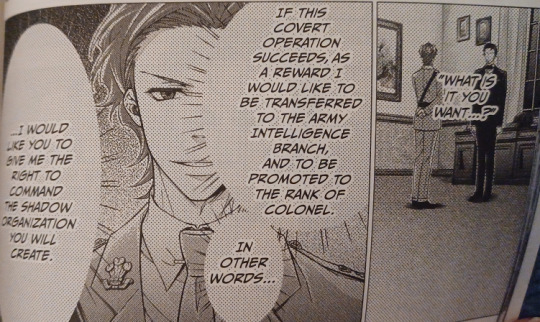
Chapter 23:
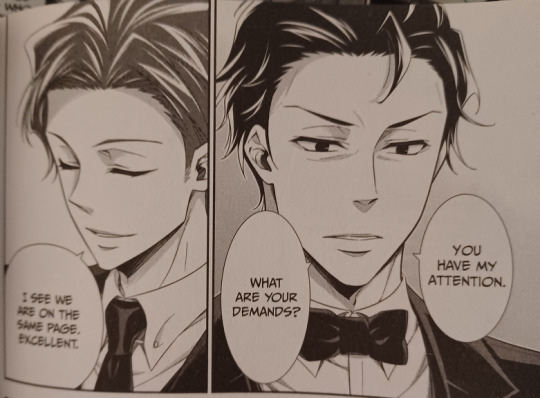
Btw, in Scandal in the British Empire...why does Mycroft introduce himself to the Queen? Never mind, not why we're here. Again, my weird innuendo sensors perk up in Chapter 17 at "I did not drag you out of bed this early for nothing." Maybe it's because my perception of Victorian niceties, whether it's factual or not, is that there was this sense of avoiding talk of physical realities. We don't speak of pregnancy, we speak of "her condition" and "confinement." We don't "go to bed," we "retire." And so on. So conversely, it feels almost suggestive to even acknowledge that someone was in bed. In whatever state of undress the might imply. *Kellen Goff Sasaki voice:* OOOH how sCanDaLOus. (Mind you I DON'T believe there is anything of authorial intent in this, again, just trying to explain the factors that make me read things a certain way.)
The little mind games: Albert immediately recognizing that he's being tested, and Mycroft well aware that something is off, that he and Albert are using each other to their own ends. All juicy ship ingredients.
Then there's this...I can't articulate why it's important. But it is. Something about mouths and thoughts. If I wasn't terribly lazy, I'd go digging for examples in various manga series and I have a pretty firm suspicion that I could prove that, often, Mouth-Focus Thinking Panel + Name = Ship.
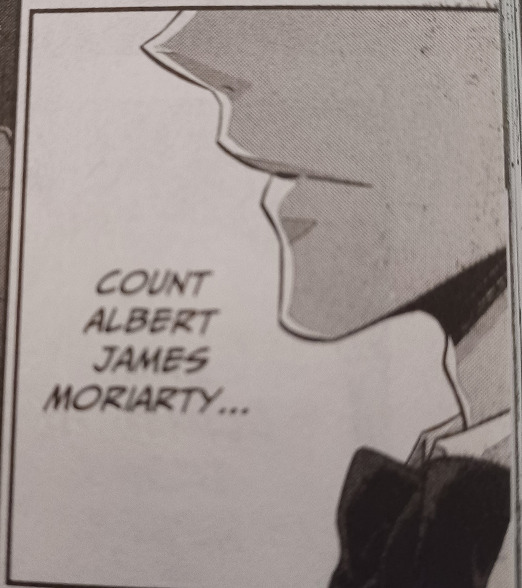
Jumping forward to the start of The Riot in New Scotland Yard (Chapter 29), Mycroft's demeanour has really changed. During the meeting at the British Museum he's radiating "I'm not angry I'm just disappointed" energy. He's tense, he's not sure if the Moriartys are enemies and when he understands their plan he seems understandably sad about it even as he accepts it. But now, he's radiating an almost Sherlock-like excitement. He's just gotten to see a miniature version of The Plan in action during the Jack the Ripper case, and it worked. He says he's just visiting Albert as an acquaintance (read: friend in Mycroftian), and that's what it feels like. They're chummy. It's cute. Also Albert teasing Mycroft over his squabbles with Sherlock when he leaves? When did Albert find out about that, hmm? (I mean, could be spying of course. But I like to think it just suggests they've talked more than we've seen.)
Annnnnd....cutting this part off here because I'm bored of it for now and it's long. I'll do the rest when the mood strikes. 😂
#yuukoku no moriarty#moriarty the patriot#mycal#alcroft#meta or something#been a while since i've done one of these 'not meta so much as just a disorganized stream of consciousness' long-posts lol
203 notes
·
View notes